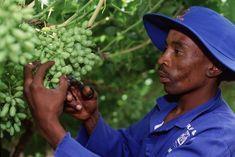
As mentioned in last week's Journal, an historic message from former President Nelson Mandela gave the Thandi initiative a resounding launch in London last week.
The message from Mandela appealed to the retail trade in the UK to support the Thandi initiative. “Support for Thandi will help create a whole new generation of proud and committed fruit entrepreneurs, which will ensure that retailers and consumers have access to the finest fruit in the world”, he said.
The South Africa High Commission hosted the event that announced the imminent arrival of the first Fairtrade-branded grapes in UK stores. Around 100,000 cartons of seedless grapes will come into the UK through the project this season, with the Co-op reportedly stocking fruit this week and Tesco due to follow soon.
The seedless grapes follow the arrival of the first ever Fairtrade apples, oranges and lemons from Thandi in August, and were enthusiastically welcomed by the High Commissioner and a healthy audience at the Trafalgar Square venue.
“The significance of this event should be lost on no-one,” she said. “The boycott of South African products [due to Apartheid] began here and now we are launching another campaign ñ Buy South African Fairtrade fruit.
“Fairtrade is helping to support the ambitions of the South African people and to erase the memories of oppression, exploitation and racism. Fairtrade premiums are ploughed straight back into the communities and the spirit of partnership makes the Thandi Initiative a success throughout the chain.”
The grapes are from the vineyards of Keboes Farms in the Orange River region of the Northern Cape province. More than 300 workers are now shareholders in the farm and a committee will decide how to use the Fairtrade premium which is for social development projects. Keboes Farms is one of five fruit farming projects in South Africa which are members of the Thandi Initiative and which have been certified by the Fairtrade Labelling Organisation, the international body of which the Fairtrade Foundation is the UK member.
Piet Karsten, managing director of the Karsten Group, which co-owns Keboes Farms along with the shareholder workers and the para-statal Industrial Development Corporation, said the farm has met all his expectations. “We have created a unique model that could be used in other parts of the world. Table grape production is located in some of the world's remote poverty stricken regions and our group look forward to use our knowledge and expertise at similar projects that could create ownership opportunities for workers in other parts of the world.”
The Thandi Initiative was started last year by the Capespan Foundation as part of its effort to support the South African government's land transformation programme by encouraging joint ownership and empowerment through capacity building in South Africa's fruit industry.
“It is our aim to create world class black fruit growers,” says Nazeem Sterras, chief executive of the Capespan Foundation. The Foundation is supported by the Capespan Group, which has made its international marketing and distribution infrastructure available to market Thandi fruit and to provide technical and other assistance.
The British Government's Department for International Development and the Business Linkages Challenge Fund have also supported the initiative, as well as the South African Department of Trade and Industry.
Hilary Benn, secretary of State for International Development, said: “Economic growth is key to poverty reduction. That is why we need to embrace the entrepreneurial spirit of developing countries and find ways of generating jobs and income and improving market access for producers. The Thandi development project is a prime example of business working directly with employees to do just this, and helps deal with the issue of distribution of agricultural land.”



